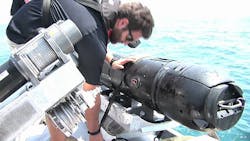Navy asks Hydroid to ramp-up production of MK 18 Kingfish unmanned underwater vehicle (UUV)
INDIAN HEAD, Md., 23 Nov. 2015. Unmanned underwater vehicle (UUV) experts at Hydroid Inc. in Pocasset, Mass., are ramping-up production of the company's MK 18 Kingfish family of unmanned submersibles under terms of a $8.7 million contract announced Thursday.
Officials of the Naval Surface Warfare Center (NSWC) Indian Head Explosive Ordnance Disposal Technology Division in Indian Head, Md., are asking Hydroid to increase quantities for the procurement of additional MK 18 family of system assets.
The Navy's MK 18 UUV is a variant of the Hydroid REMUS 600, which Hydroid developed originally developed through funding from the Office of Naval Research (ONR) in Arlington, Va., to support the Navy's UUVs with extended endurance, increased payload capacity, and greater operating depth.
The REMUS 600 can dive to depths of nearly 2,000 feet, and can operate on one battery charge for as long as 24 hours. The UUV is for mine countermeasures; harbor security; debris field mapping; search and salvage; scientific sampling and mapping; hydrographic surveys; environmental monitoring; and fishery operations. REMUS is short for Remote Environmental Measuring Unit S.
The torpedo-shaped REMUS 600 UUV is nearly 13 feet long and two feet in diameter. The unit weighs 622 pounds. It has dynamic focus side look sonar (SLS), a Neil Brown conductivity and temperature sensor (CT), WET Labs beam attenuation meter (BAM) optical sensor, Imagenex 852 pencil beam sonar for obstacle avoidance, and a WET Labs ECO fluorometer and turbidity measurement sensor.
Its communications suite consists of a long baseline acoustic communications, WiFi, Iridium satellite communications, and radio modem via gateway buoy. The UUV navigates by up- and down-looking acoustic Doppler current profiler; Doppler velocity log; Kearfott inertial navigation unit; compass; and GPS.
The REMUS 600 has a modular design to meet a variety of payloads. The UUV has a series of hull sections that can be separated for vehicle reconfiguration, maintenance, and shipping. IT uses the Hydroid Vehicle Interface Program (VIP) for maintenance, checkout, mission planning, and data analysis.
On the current contract Hydroid will do the work in Pocasset, Mass., and should be finished by September 2017. Hydroid is a subsidiary of Kongsberg Maritime AS in Kongsberg, Norway.
For more information contact Hydroid online at www.km.kongsberg.com/hydroid, or the NSWC Indian Head Explosive Ordnance Disposal Technology Division at www.navy.mil/local/nswciheodtd.

